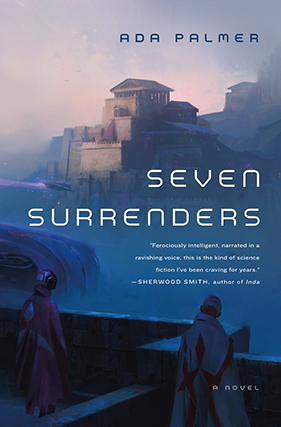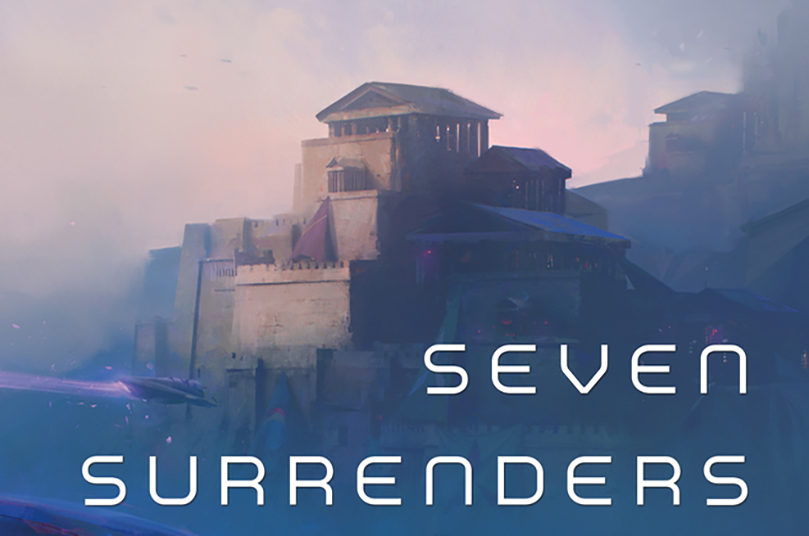opens in a new window Written by Ada Palmer
Written by Ada Palmer
One question a science fiction writer faces when world-building a future Earth, alongside questions of future technology and future politics, is the question of future history. What will people in this future call the twentieth and twenty-first centuries? They can’t call them ‘modern’ since the nineteenth century called itself “modern” with its steamships and telegraphs; the eighteenth century called itself “modern” with its spinning jennies and lightning rods; even the Renaissance called itself “modern” with its arquebuses and donkey-powered winches. So, when setting a story in the future, the title “modern” belongs to whenever the story takes place, leaving our age in need of a new name—and what name that future uses for this era can tell you a lot about how it sees itself and its past, and what has happened in between.
Let’s try on a few for size.
How about a 25th century that calls our era the Computer Age? It’s a straightforward option, but using it implies that, in this particular future, the development of computers is considered to be the most important aspect of our age—and if this 25th century believes the Computer Age is over, then we instantly want to know what came after it. What new technology is humanity’s big focus if computers came in and went out, like the Age of Steam?
What if, instead, this era is called the Nationalist Era? That focuses our minds on politics rather than technology, implying that our political and cultural tumults are considered the defining factor of our age and that some huge political change must have brought the Nationalist Era to an end.
What if they call these centuries the Genocidal Age? Or the World War Era? Such names are simultaneously deeply upsetting, predicting that we will be remembered above all for our darkest failures, and strangely hopeful, since they imply futures where humanity has moved beyond such things. Calling it the Early Mormon Era, like the Early Christian Era, makes a whole sequence of historical and cultural changes play out in the reader’s mind with just three words. What if this future that calls our age the Space Age? If the 2400s see themselves as being as far beyond the Space Age as we are beyond Shakespeare, then either humanity has given up on space exploration, and considers it a blip in their past like the 19th century vogue for spiritualism or the 12th century obsession with Aristotle–or it means there’s some new frontier beyond space which makes the Space Age feel as quaint to this future as the Age of Sail does to us. The Screen Age. The Digitization. The Greenhouse Era. The Educational Revolution. The Age of Capital. The Age of Free Capital. The Age of Capital Lockdown. By showing what characteristic looms largest in the future’s memory of now, each name does tons of world-building, or rather world history building, in one short phrase.
Even more can be packed in if you use a historical name which—like Late Antiquity or Early Industrial Revolution—implies that our centuries are mostly important for their relation to some even more important neighboring era. If this is the Prepandemic Age, then 2100+ are going to be very bad centuries; if this is the Late Pandemic Age, they’re going to be great centuries. The Early Unification. The Late National Era. The Late Surface Era. The Interimperium. The Truce. The Early Digital Ages. The Late Digital Ages. Comparative labels with a strong judgment—positive labels, negative labels—can also imply enormous amounts about what comes after the 21st century. Are we the Dark Digital Age? Or the Golden Digital Age? Are we the Dark Interracial Age? The Golden Interracial Age? Entire future histories spin out in the imagination from each one.
Related to the question of naming the past is the question of how a future world divides its past. We divide our history into different sections: ancient, medieval, and modern, with a few more detailed subdivisions: Hellenistic, High Medieval, Renaissance, or Enlightenment. But those subdivisions haven’t been permanent. One of the big revolutions of the Renaissance was that they changed where they drew the dividing lines in History, from the Medieval European subdivision of history into two parts—an early, bad, pre-Christian age and a later, good, Christian age—to a three-part division: the golden age of Antiquity, then the bad Middle Ages or Dark Ages, and then the good modern age, which we now call the Renaissance. So where does the future draw its lines around us? Is the 20th century the first part of an era that extended through the 24th? Or the last stage of an era that began in the 17th? Are we characterized by being part of a continuity with the ages of scientific revolution, exploration, colonialism, and industrialization that came before us? Or are we separated from them by some vital characteristic that even the 25th century sees as a step more modern? And if, for us, the famous dividing dates of historical epochs are the conquests of Alexander the Great, the fall of the Roman Empire, the Norman Conquest, the French Revolution, and the First World War, what are the most famous dates in this future’s understanding of its history?
In my own Terra Ignota novels, I intentionally waited a long time before revealing what the year 2454 calls our century, or where it draws its big historical lines. I waited until the reader had learned a lot about this 25th century: its flying cars and robot helpers, its 150 year life span and chilling censorship, its new borderless nations and old persistent monarchies, its painstakingly slow Martian terraforming project and its painfully familiar tensions over religion, race, and gender, which take new forms but are still the recognizable old problems. It’s a 2454 with many good features and many bad ones, but it isn’t nearly as far beyond the present as we expect of the 25th century, if Star Trek had us exploring the galaxy’s depths by the 23rd. I tried to pack a huge amount of world-building into the two little words I chose. Read Seven Surrenders and let me know if you agree with my choice.
So what does your 25th century call our age of history? And why?
Order Your Copy
Order Your Copy
opens in a new window opens in a new window
opens in a new window opens in a new window
opens in a new window opens in a new window
opens in a new window opens in a new window
opens in a new window opens in a new window
opens in a new window
Follow Ada Palmer on Twitter, on Facebook, and on her website.







Maybe “The Brink”, harking back to the time when everything _almost_ ended?
Obviously, we survived until the 25C, but we’d look back at the time when we developed and so nearly used our global WMDs, when we chose to spike our global temperature, when our fish stocks were trawled into collapse, when our agricultural monocultures’ genetic vulnerability nearly starved us, when our obsession with growth met the world’s natural limits. When we teetered on the brink.
Interesting that Seven Surrenders will look back to our time.
I recently wrote a TLtT timeline, consisting mainly of events that Mycroft describes from 2454. There is a big gap between the Enlightenment and the Mukta flight in 2073.
As for how I’d refer to our era from 2454. I’d refer to it as postmodern. I’d do so ironically, because I’d perceive it as an era:
– that thought it had moved beyond modernity
– in which irony abounded.
Fascinating. I can’t go so far as naming our “era”, but I think a few decades might be viewed as “the beginning of Digitization”, or early Digitization period”.
This is a great article with great questions. One thing that characterizes our age is the massive social experimentation which is happening almost accidentally as a result of a declining respect for received values and the voices of the past. Emancipated sex, easy divorce, gay marriage and transgenderism are changes to the most basic human institutions – more basic even than the existence of the state. The intended and unintended consequences of this are almost impossible to foresee, but they will certainly be massive because they are changes to the most basic ways we relate to each other. I cannot imagine that any technological issues will have the impact that these social changes will.
We are now entering the “New Dark, We’re Not Kidding It Was Really Super Dark, Like You Wouldn’t Believe How Bleak it Got” Age.
I’m pretty sure the only name from my lifetime that everybody will know 1000 years from now is Neil Armstrong. I’d say we live in the Early Space Age.
Add to that the early nuclear age. As so many ages referred to the energy technological advancements or perhaps the early solar age.
I think this may be the tail end of the Age of Employment. The way things are looking, in fifty years time there may be no need for human labour at all. (We have yet to see whether that’s a net good or net bad – that depends a lot on how well we handle the transition).
Or maybe it’s simply the last dying gasps of the pre-Facebook age…
Ages prior to ours have been characterized by religious world-views, so I’d say we live in the Early Scientific Era, and have been since Einstein published the first part of his theory of relativity. It’s early days still, since most of the world’s population is still religious.
I can see that in a sense except, Einstein built upon Newton. So where does it really begin?
Said it on Twitter, but I like the Computer Age idea. It’s not that computers are going to go away, but the development, refinement and networking of computers is not only the most important technological development of the late 20th/early 21st century, it’s arguably the *only* important technological development. (Most everything else stems from advancements that come from computing.)
It’s like, say, the Iron Age. we still use iron all over the place, but it doesn’t define us. It’s just one of the materials we use. That’s likely how the future will look at computers: they’ll be tools used to get most of the boring work done, so that people can do [insert interesting ideas about what post-work humans would be up to here].
[You know we’d get bored with poetry after a while so, I dunno, nonlethal duelling?]
(Also, that last graf was a heck of a sell. Going to track down these books tonight.)
The Crazy Years?
Why not call it the Age of Extinction? By the beginning of the next century, the world’s biomes look likely to be drastically simplified. This might matter to people who have to live with the consequences.
The Century When Antibiotics Worked.
the Feminist Era? the Early Progress Era?